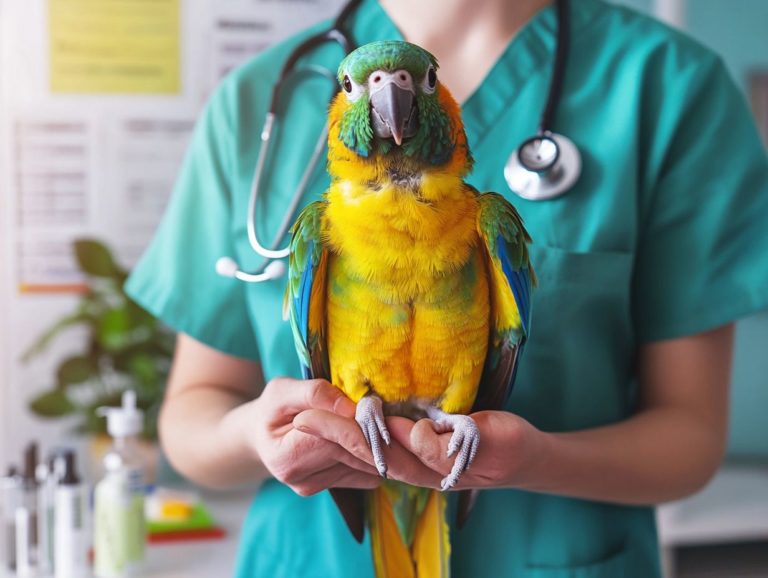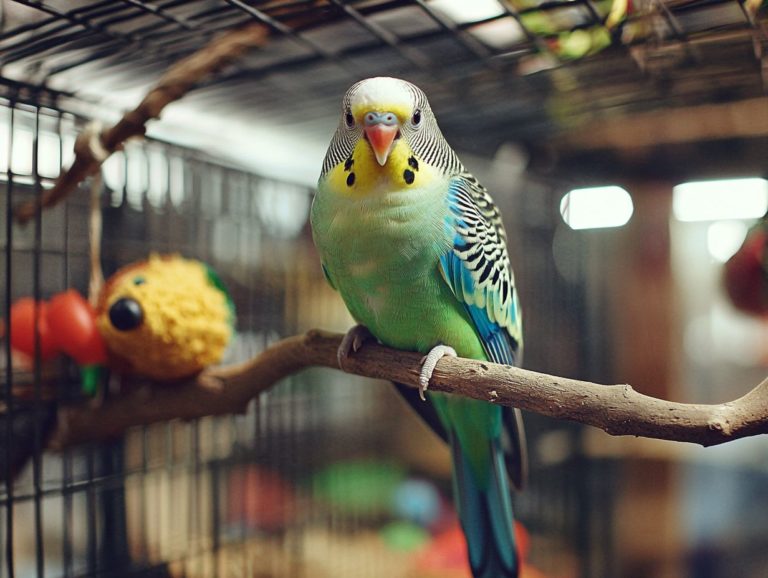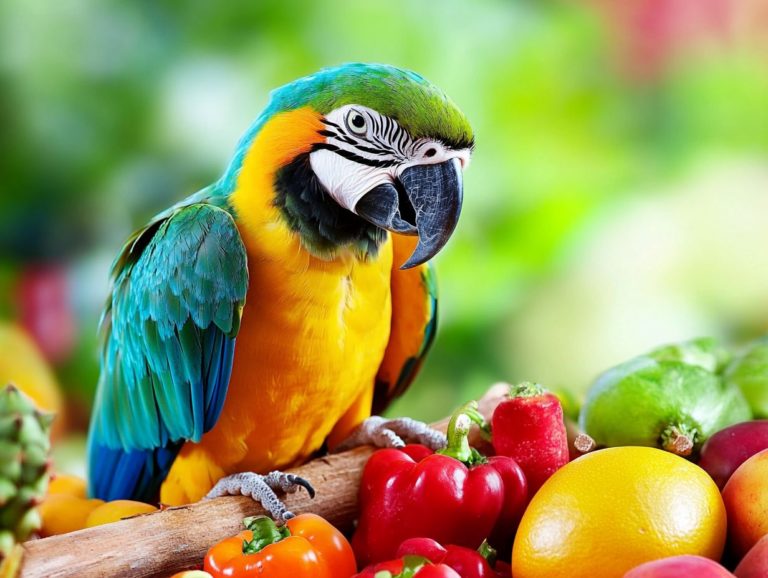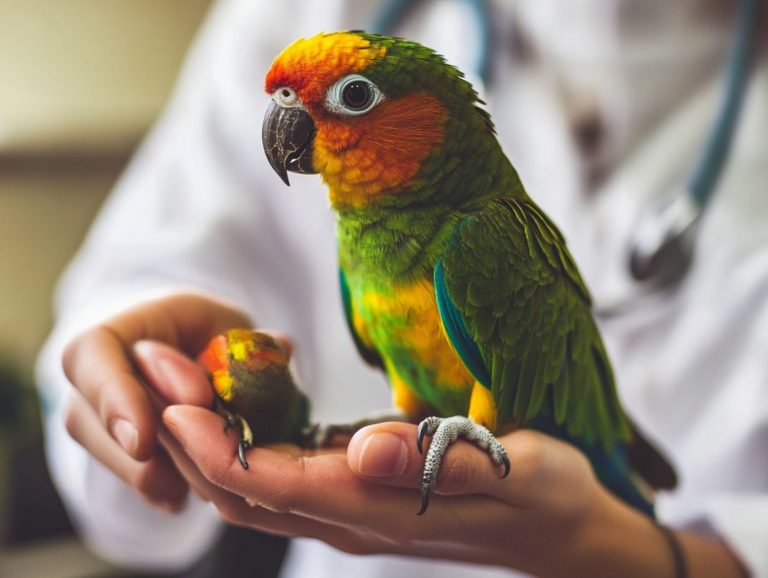The Importance of Regular Exercise for Birds
Exercise is just as important for your birds as it is for you. They need regular activity to stay healthy and sharp.
This article explores various types of exercises perfect for birds, from flight and wing workouts to fun activities that keep their minds engaged.
You ll find tips on creating an enriching environment, discover the many benefits of regular exercise, and learn about common pitfalls to avoid.
Dive in to uncover the vital role that exercise plays in enhancing your bird’s overall well-being!
Contents
Key Takeaways:

- Regular exercise is crucial for maintaining the physical and mental well-being of birds.
- Providing a stimulating environment and engaging in bonding activities can help encourage birds to exercise.
- Consistent exercise can prevent problems in behavior and promote overall health in birds.
Why Exercise is Important for Birds
Exercise is vital for your birds, promoting their overall health and well-being. It addresses their physical needs and helps prevent serious conditions like heart disease and obesity. Additionally, understanding the importance of regular vet visits for birds ensures they receive the care necessary to thrive. Engaging your pet birds in regular physical activity not only satisfies their natural instincts but also fosters companionship and mental stimulation.
This keeps their lives vibrant and exciting! By understanding the significance of exercise, you can create an environment that supports your feathered friends in living healthily.
Dr. Jennifer Graham emphasizes that different types of birds thrive on movement that mirrors their natural behaviors climbing, flying, and exploring. Without enough exercise, birds can become lazy, which can lead to obesity and serious health risks.
Consider incorporating toys, climbing structures, and routines that encourage active play. Restrictive cages worsen these issues, making it essential for you to critically assess your pet s living conditions.
By prioritizing exercise, you enhance your birds’ physical health and contribute to their psychological well-being, creating a happier and more harmonious environment for them.
Types of Exercise for Birds
Explore various forms of exercise that meet the unique needs of birds. Engaging in flight, physical activity, mental stimulation, and foraging is vital for their health and happiness.
You can enhance their environment by adding toys that encourage interactive play, creating a safe area for flight, and introducing foraging opportunities that reflect their natural habitat.
By ensuring your pet birds participate in a variety of exercises, you improve their physical condition and enrich their behavior and overall well-being.
Flight and Wing Exercise
Encouraging flight and wing exercise is essential for maintaining your birds’ physical health. It helps them build strong muscles and coordination, fulfilling their natural instinct to soar.
You can support this type of exercise by creating safe spaces for free flight and ensuring that proper wing trimming practices don t hinder their ability to engage in this vital activity. Regular flight opportunities can become an effective routine that promotes cardiovascular health and overall well-being.
Establishing a secure environment is key to facilitating this activity, as it protects your birds from hazards while encouraging confident flying.
Incorporating various perches, open areas, and even obstacle courses can stimulate their instincts and inspire exploration.
A consistent routine that balances flight sessions with rest is crucial to prevent fatigue, ensuring they are ready for more vigorous activities. By understanding their needs and fostering healthy habits, you can significantly enhance the quality of life for your avian companions.
Physical Activity and Mental Stimulation
Physical activity combined with mental stimulation is vital for preventing boredom and behavioral issues in birds. It encourages them to engage with their environment and tap into their natural instincts.
Activities like climbing, playing with toys, and interactive grooming offer not just physical exercise but also stimulate cognitive functions, leading to a happier and healthier pet bird. Establishing a varied routine that includes both physical and mental challenges is essential for meeting their enrichment needs.
Consider incorporating toys that challenge their ability to solve problems, such as puzzle feeders, to make daily interactions more engaging. Socialization opportunities, whether through interactions with you or with other birds, are crucial for fostering essential social behaviors and emotional well-being.
Establishing routines that encompass structured playtime, exploration, and even moments of quiet reflection can significantly alleviate stress and anxiety.
This blend of enriching activities not only enhances your bird’s quality of life but also strengthens the bond between you and your feathered companion.
How to Encourage Exercise in Birds

Encouraging exercise in birds demands a thoughtful approach that enriches their environment and provides a variety of activities. By creating spaces that stimulate natural behaviors like climbing and foraging, you can significantly enhance your bird’s exercise routines and overall joy.
Engaging in training that promotes interaction and fun is crucial. Incorporating toys and games into your daily interactions nurtures a love for physical activity and ensures your birds stay active and engaged.
This thoughtful engagement transforms their exercise into an enjoyable part of their day.
Creating an Enriching Environment
Transform your birds home into an exciting playground! Creating an enriching environment is essential for their physical and mental well-being, allowing them to engage in natural behaviors and safely explore their surroundings.
Key elements include:
- Thoughtfully designed living spaces with appropriate caging
- Engaging toys that challenge their intellect think puzzles or interactive gadgets
- Ample space for movement, varied perch heights, and different textures
- Foraging opportunities that mimic natural hunting instincts
This kind of environment satisfies their instincts and helps to ward off boredom, preventing behavioral issues. By creating such an inviting atmosphere, you can foster better social bonding and promote a sense of security, leading to happier, healthier avian companions.
Training and Bonding Activities
Training and bonding activities are crucial for cultivating a strong relationship between you and your birds. They not only enhance companionship but also ensure regular exercise.
Engaging in interactive activities, like target training or trick training, provides essential physical stimulation while nurturing a deeper emotional connection. These training sessions can evolve into enjoyable routines filled with fun and playful interactions.
Incorporating a variety of toys and puzzles during these sessions can further engage your birds minds, allowing them to explore and solve problems in a safe environment. Activities like flight recall training or mealtime enrichment, where your birds are encouraged to forage for their food, play a vital role in their overall development.
By establishing a consistent routine that blends physical and mental challenges, you can create a fulfilling atmosphere that promotes well-being. Don t wait! Start enriching your bird s life today with engaging activities that foster love and excitement!
Benefits of Regular Exercise for Birds
Regular exercise provides a wealth of benefits for birds, enhancing both their physical and mental health. This ultimately contributes to their overall well-being. By engaging in consistent physical activity, your feathered friends support their heart health, maintain a healthy weight, and lower their risk of heart disease.
This activity also offers vital mental stimulation that keeps boredom at bay and prevents behavioral issues. Such positive effects strengthen the bond between you and your pet birds, fostering a happier and more interactive companionship.
Physical and Mental Health Benefits
The physical and mental health benefits of exercise for birds are profound. They significantly enhance their longevity and quality of life.
Incorporate various exercises that include play and social interactions into their daily routine. This not only helps maintain a healthy body weight but also strengthens cardiovascular health, reducing the risk of heart disease. Activities like climbing and foraging, flying, and interactive play stimulate their muscles and enhance coordination.
Providing toys and puzzles is essential for keeping their minds active. This addresses obesity and stress-related and unwanted behaviors that can arise from boredom. Promoting a balanced lifestyle that meets the emotional needs of birds is key to their happiness! By ensuring dynamic movement and stimulating activities, you can help your feathered companions, such as parrots and macaws thrive, allowing them to experience happier and enriched lives.
Preventing Behavioral Issues

Preventing behavioral issues that arise from a lack of stimulation can often be accomplished through regular exercise. This effectively addresses boredom and meets their enrichment needs. When birds lack sufficient mental and physical stimulation, they may develop problematic behaviors, such as feather damaging and excessive vocalization.
Weaving exercise into their daily routine can significantly diminish the chances of these behaviors arising, fostering a more harmonious living environment. Exercise burns off excess energy and stimulates their natural instincts to explore and forage, keeping their minds sharp and active.
You might find that incorporating activities like climbing, swinging, or teaching them new tricks yields remarkable benefits. This active engagement distracts them from unwanted behaviors that often stem from boredom. Offering alternatives like puzzle toys, foraging opportunities, and social interactions enriches their daily experiences. This ensures their needs are met and leads to a more balanced and content bird.
Common Mistakes to Avoid
When considering exercise for your birds, it’s crucial to steer clear of common pitfalls that can compromise their well-being and safety considerations during flight to ensure safety. Both overexercising and underexercising can lead to stress and boredom. Underexercising can result in serious health concerns, from stress-related issues to physical injuries.
Recognizing the significance of a balanced approach to both exercise and feeding routines should be part of their daily routine. This is vital for nurturing a healthy and comfortable environment for your feathered companions.
Overexercising or Underexercising
Both overexercising and underexercising can seriously jeopardize your birds’ health and well-being. Striking the right balance in their exercise routines, which include fun activities, is imperative.
Finding this equilibrium is essential. Excessive physical activity can result in behavioral issues, such as aggression or anxiety, as well as physical problems like joint issues and undue strain on their delicate bodies.
On the flip side, insufficient exercise can lead to weight gain, lethargy, and a lack of mental stimulation, risking boredom and even depression.
By remaining attentive to your avian companions’ needs and tailoring their exercise routines to incorporate safe and varied activities, you can ensure that your birds lead healthier and happier lives.
Unsafe Exercise Practices
Unsafe exercise practices can lead to accidents and injuries for your birds. Prioritize safety in any exercise routine. Activities involving unmonitored flight in unsafe environments or lacking adequate supervision pose risks to your pet birds.
Ensure the exercise methods you employ are safe and appropriate for your bird’s size and species. This is crucial for their physical health and overall well-being.
Avoid environments with sharp edges, open windows, or any potential hazards. Monitor your bird during exercise to quickly detect any signs of distress, anxiety, or fatigue, allowing for timely intervention.
Choose the right toys and equipment that ensures physical comfort and safety. This will help prevent chafing or accidents during playtime. A structured routine boosts fitness and meets emotional needs, creating a happy living environment for your birds.
Regular health check-ups will ensure that your routines align with their well-being.
Frequently Asked Questions
What are the benefits of regular exercise for birds?

Regular exercise is essential for birds. It improves their physical health, provides mental stimulation, and enhances overall well-being. Understanding the role of exercise in avian health also helps prevent obesity and boredom, which can lead to health issues.
How does regular exercise improve a bird’s physical health?
Regular exercise helps birds maintain a healthy weight, strengthens their muscles and bones, and improves their cardiovascular health. This can lead to a longer and happier life for your bird.
What are some examples of exercises for birds?
- Flying
- Climbing
- Foraging
- Playing with toys
These activities can be done both inside and outside of their cages, providing ample opportunities for your bird to stay active.
Why is mental stimulation important for birds?
Like humans, birds need mental stimulation to stay sharp and prevent boredom. Regular exercise keeps their minds engaged, improving cognitive abilities and preventing behavioral issues.
How often should birds exercise?
The frequency of exercise depends on a bird’s species, age, and health. As a general rule, birds should have at least 30 minutes of exercise daily, which can be divided into shorter sessions.
What are some signs that a bird may need more exercise?
If your bird shows signs of boredom, such as excessive screaming, feather plucking, or destructive behavior, it may need more exercise. Consult a veterinarian for tailored exercise recommendations if you notice changes in behavior.






